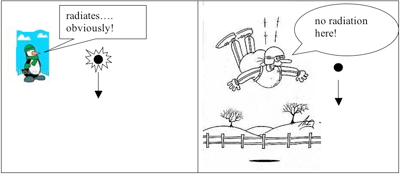PARADOXES
Paradoxes are a fun way to gain a deeper understanding of Physics.
The paradox of the uniformly accelerating charge

Does a uniformly accelerated charge radiate?
It is well known from electromagnetism that an accelerated charge radiates. Therefore an inertial observer (the Penguin), would state that the charge radiates.
However, a uniformly accelerated observer moving with the charge would observe it to be at rest. According to the equivalence principle, only a regular coulomb static field should be observed. No radiation should be detected.
One observer says the charge radiates. The other one says it does not.
Does the charge radiate?
Bell’s Spaceship Paradox
Two spaceships are initially at rest and are separated by a distance L in a given inertial frame (referred to as the “rest” or “lab” frame). The two spaceships are connected by a taut string. At time t=0 in the lab frame, the two spaceships start to accelerate with the same proper acceleration. Does the string eventually break? According to the physicist John S. Bell, a clear consensus of the CERN theory division was that the string would not break. What do you think?

